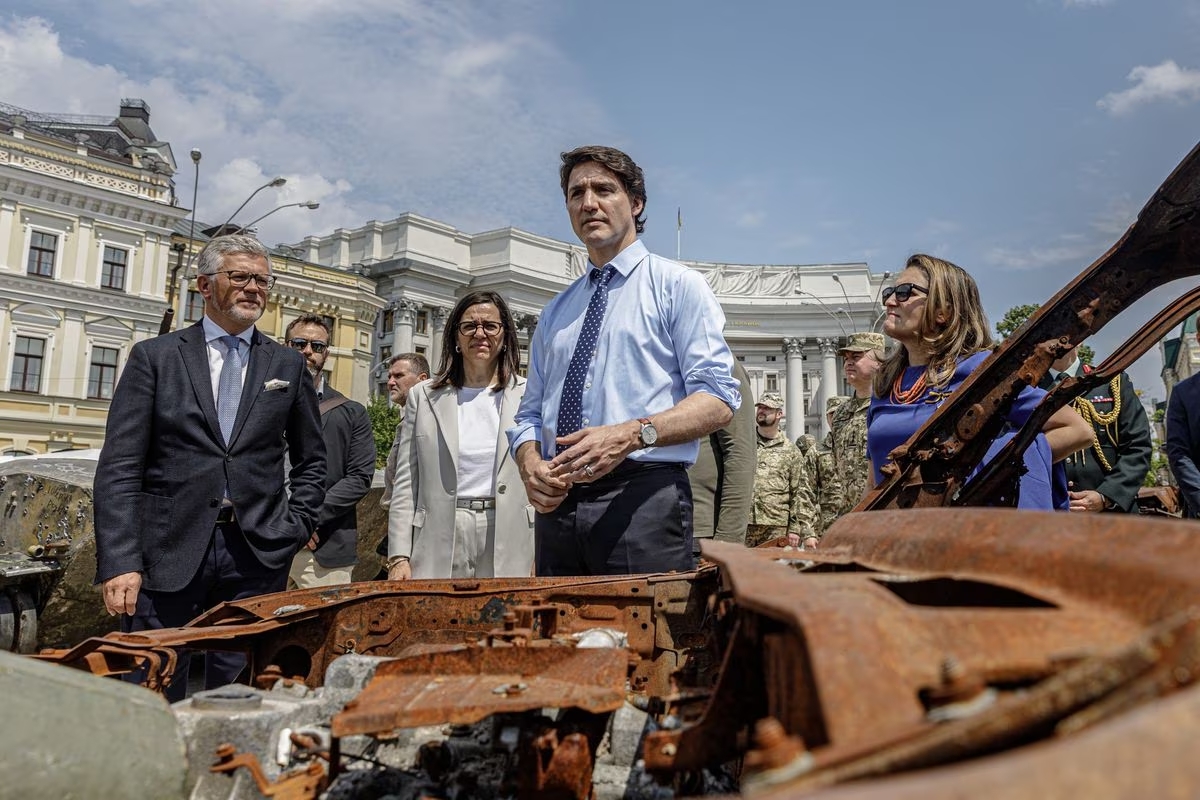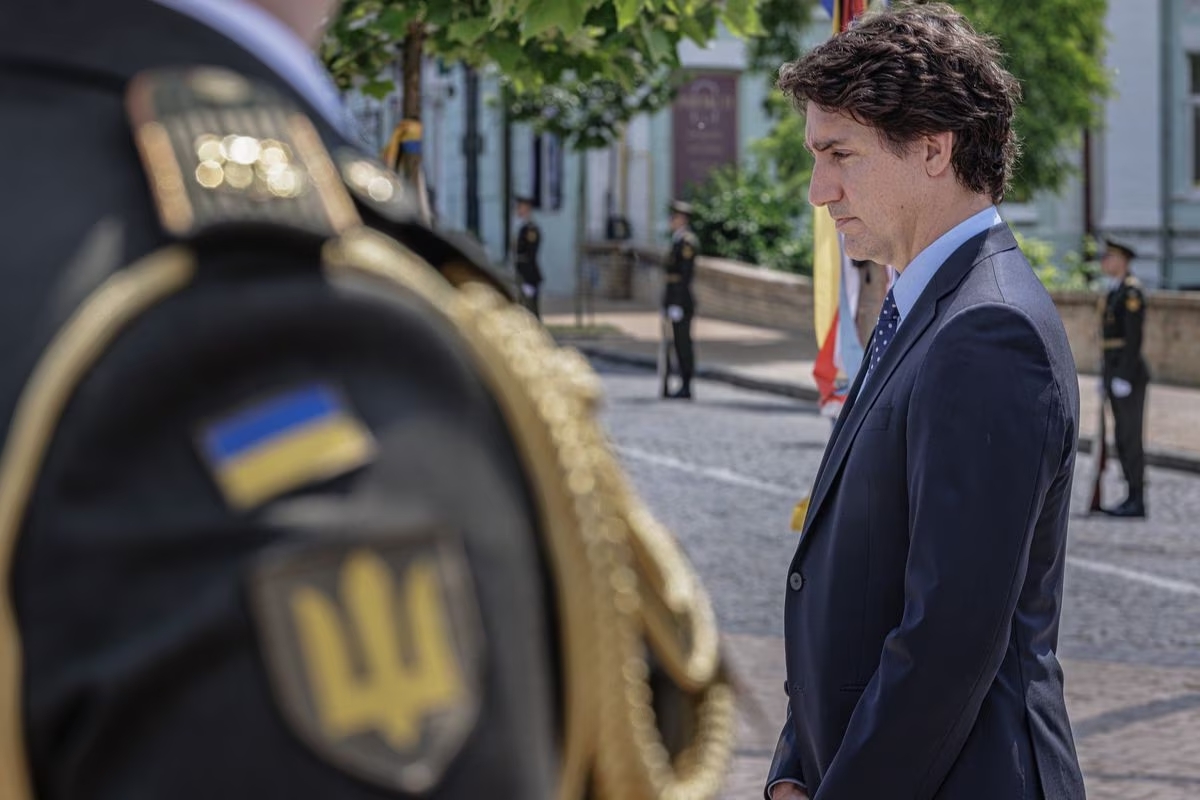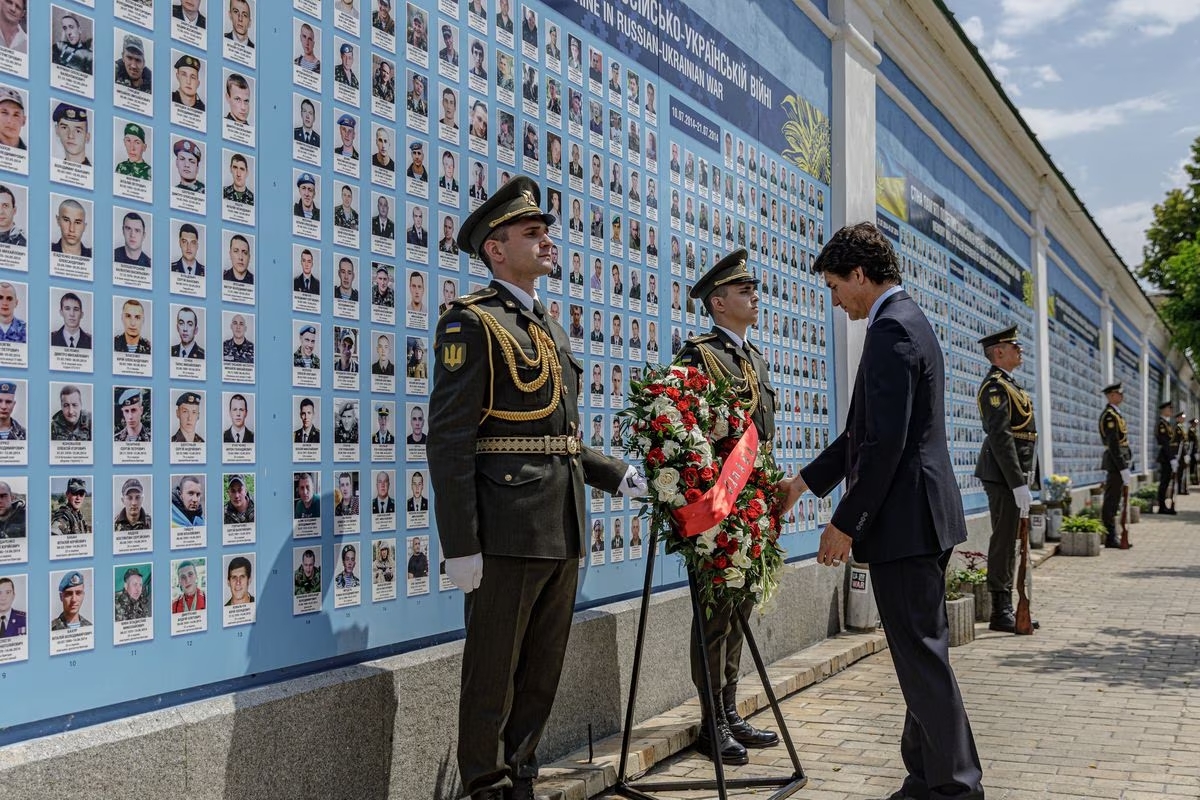
Prime Minister Justin Trudeau walks near burnt Russian armour during his visit to Kyiv on June 10. ANTON SKYBA/THE GLOBE AND MAIL
The headline from Prime Minister Justin Trudeau’s whirlwind trip to Kyiv on Saturday was always going to be Canada’s commitment to provide Ukraine with an additional $500-million in military aid.
But more weapons, while critically important at a time when the country is fighting a Russian invasion, is not what Ukrainians look first to Canada for. There are other countries – most notably the United States, Britain, Germany and Poland – which have more warplanes, tanks and missiles to give to Ukraine, and which are better-placed to deliver them.
That doesn’t mean Canada lacks clout in Kyiv. Far from it. The multiple standing ovations that Mr. Trudeau received during his speech to Ukraine’s parliament, the Verkhovna Rada, speak to the affection Ukrainians have for the country that was second in the world to recognize their independence in 1991, and which plays host to the world’s second-largest Ukrainian diaspora.
As Mr. Trudeau spoke – telling the Rada that “the brave people of Ukraine have reminded the world that democracy is both important enough to die for, and strong enough to win” – MPs held aloft two large Canadian flags from their seats.
But it was in his private meeting with Ukrainian President Volodymyr Zelensky that Mr. Trudeau really found his voice – as well as Canada’s historic role in Ukraine. Amid a discussion about the battlefield situation, and how Canada could help nudge along Ukraine’s NATO accession process, Mr. Trudeau gently prodded Mr. Zelensky about some worrying trends.
“We talked about the importance of press freedom. I brought up the situation with The Globe and Mail photographer,” Mr. Trudeau told reporters in a scrum at the Canadian embassy in Kyiv, referring to the case of Anton Skyba, a long-time Globe photographer whose accreditation to cover the conflict expired on May 1 and has not been renewed.
It’s not just about Mr. Skyba’s case. The New York-based Committee to Protect Journalists called on Friday for Ukraine to “ensure that journalists covering the war are not pressured over their reporting,” citing multiple cases where reporters and photographers had been questioned by the country’s SBU security service and “pressured to take certain approaches in their reporting.”
While all armies put restrictions on journalists in wartime, Ukraine is charting a worrying course by interrogating journalists about their parents, and suggesting that their work is somehow unpatriotic.

Prime Minister Justin Trudeau commemorates soldiers fallen in the Ukrainian war during his visit to Kyiv on June 10. ANTON SKYBA/THE GLOBE AND MAIL
The country has been under martial law since Feb. 24, 2022, the first day of the Russian invasion. While most Ukrainians support the idea that the government and military need to do whatever it takes to win the conflict, Mr. Trudeau was tapping into a quiet but growing concern among diplomats and civil-society activists about the long-term direction that Ukraine is heading in.
Martial law means Ukraine won’t be able to hold presidential and parliamentary elections next year, as scheduled, unless the war is over by then. The measures also meant that there was no media in attendance to see Mr. Trudeau’s speech to the Rada, since journalists and all members of the public have been barred from parliament since the start of the invasion.
“We’re going to continue to talk about the best practices of democracy with all of our friends, as we always do around the world,” Mr. Trudeau said when asked whether he had raised such issues with Mr. Zelensky. “I think it’s really important to recognize that democracy is backsliding, everywhere around the world, in different ways, is being challenged in different ways amongst some of our closest friends. And we all have to remain strong and vigilant on the principles.”
Standing beside Mr. Trudeau as he spoke was Deputy Prime Minister Chrystia Freeland. Ms. Freeland’s mother, Halyna, played a role in helping draft Ukraine’s 1996 constitution, which is currently suspended.
It’s fair to ask whether the Canadian military – which has already donated everything from hundreds of air defence missiles, thousands of artillery rounds and eight Leopard-2 tanks to Ukraine – can give anything more without compromising Canada’s ability to defend its own borders. (Though Ukraine’s deputy defence minister Oleksandr Polischuk pointed Saturday to a course whereby Canada could continue to support Ukraine’s military by buying weapons on its behalf from other countries, as it did earlier this year when it purchased an advanced NASAMS air defence system from the United States that it intends to give to Kyiv.)
But Canada is rich enough to do more on the humanitarian and democracy-building fronts.
Canadian aid for the rebuilding of Ukraine – Mr. Trudeau announced on Saturday that Canada would provide $10-million in new assistance to help the country cope with the destruction of the Nova Kakhovka dam – has so far lagged others.
The Kiel Institute for the World Economy, which tracks the different types of support countries have provided to Ukraine, calculates Canada as having donated 0.2 per cent of its gross domestic product to Ukraine during the first year of the war. This is half of what the U.S. and Britain have given, and well short of the 0.6 per cent contributed by Poland, 0.7 by Norway and roughly 1 per cent of GDP given by each of the Baltic states of Latvia, Estonia and Lithuania.
Alongside rebuilding Ukraine’s shattered infrastructure will be a need to make sure Ukraine doesn’t drift, yet again, from its democratic path.

Prime Minister Justin Trudeau in Kyiv on June 10. Mr. Trudeau announced on Saturday that Canada would provide $10-million in new assistance to help the country cope with the destruction of the Nova Kakhovka dam. ANTON SKYBA/THE GLOBE AND MAIL
Independent media and non-government organizations supported by Canada have played key roles throughout Ukraine’s modern history. In 2004 – when Vladimir Putin was still content to control Ukraine by meddling in its elections – Canadian-backed election monitors helped reveal voter fraud that would have helped the Kremlin-supported Viktor Yanukovych steal the election. Canadian support was crucial to the youth group, Pora, that led the protests that led to that year’s Orange Revolution.
Canadian-trained judges ruled that the 2004 presidential election should be run again, a rerun that finally brought Ukraine’s first pro-Western president, Viktor Yushchenko, to power.
After Mr. Yanukovych won the next election, fairly this time, it was anti-corruption activists and independent media – many of them funded by Canada and other Western backers – who shed light on his regime’s abuses of power ahead of Ukraine’s more violent Revolution of Dignity in 2014, which definitively ended Moscow’s political hold over Kyiv.
It’s a role Canada has quietly continued to play since Mr. Zelensky came to power in 2019. When the Kyiv Post, long the standard-bearer for English-language journalism in the country, replaced its entire staff – allegedly under pressure from Mr. Zelensky’s administration – Canada stepped in with a $200,000 grant that helped launch the Kyiv Independent, which was started by ex-Kyiv Post staff and which quickly eclipsed the Post in reach and impact while covering the war.
Canada has also backed the establishment of a new police force to replace the Berkut riot police that sided with the Yanukovych regime against the protesters in 2014, as well as reforms aimed at decentralizing power in the country, though the latter effort has largely been undone by martial law.
While the focus now, understandably, is on winning that war, it’s prudent for Canada and its allies to also be interested in what kind of Ukraine emerges afterward. With the government having united all of Ukraine’s main TV stations into a single broadcast – another facet of martial law – there has been little public questioning of the civilian or military leadership over the past 15 months. Whenever martial law is lifted, the only figures who are likely to have broad public support will be Mr. Zelensky and the country’s generals.
It all feels less like an intentional assault on democracy than one of the many inevitable and deleterious effects of martial law, and thus the Russian invasion. But if this is – as both Mr. Zelensky and Mr. Trudeau say – a fight to defend democracy, then the front lines aren’t just where the Ukrainian and Russian armies collide.
The battles inside Ukraine to preserve freedom of speech and information, and a fearless civil society, are also important. And these are the fronts that Canada is best equipped to provide help on.
MARK MACKINNON
SENIOR INTERNATIONAL CORRESPONDENT
The Globe and Mail, June 11, 2023
